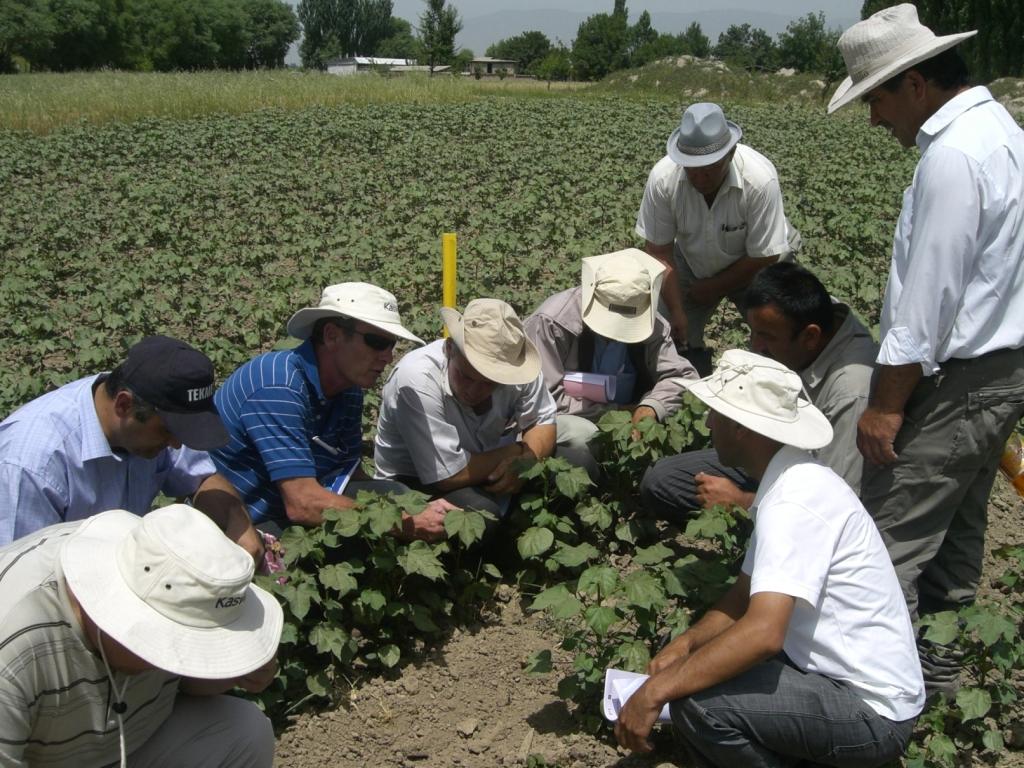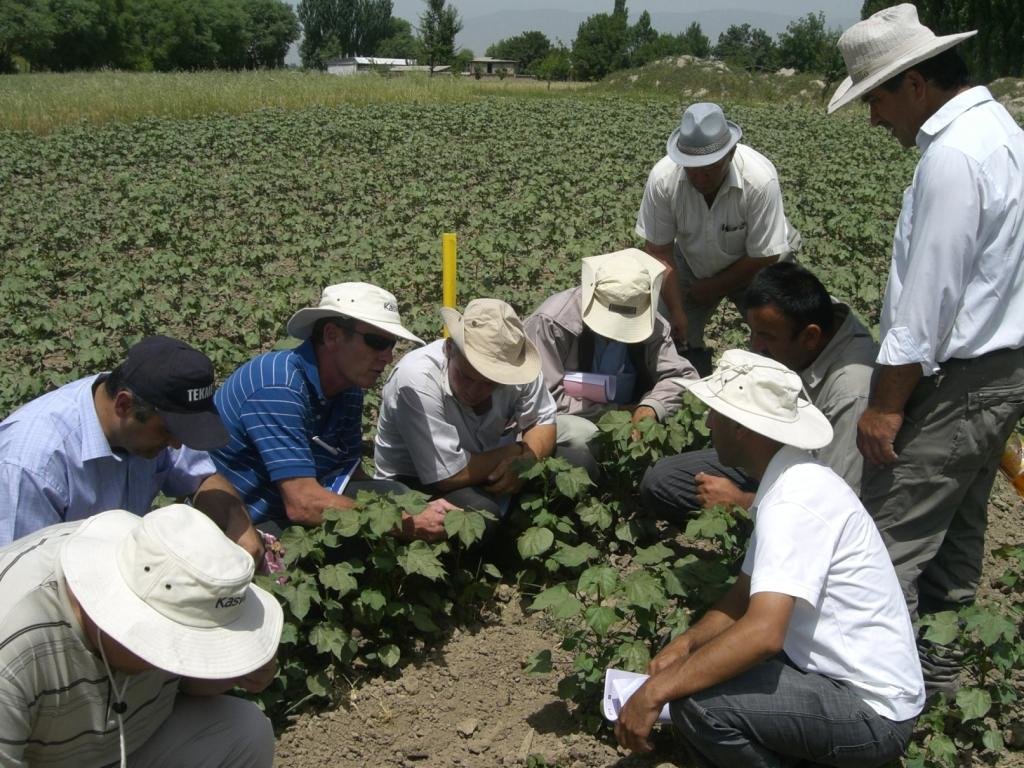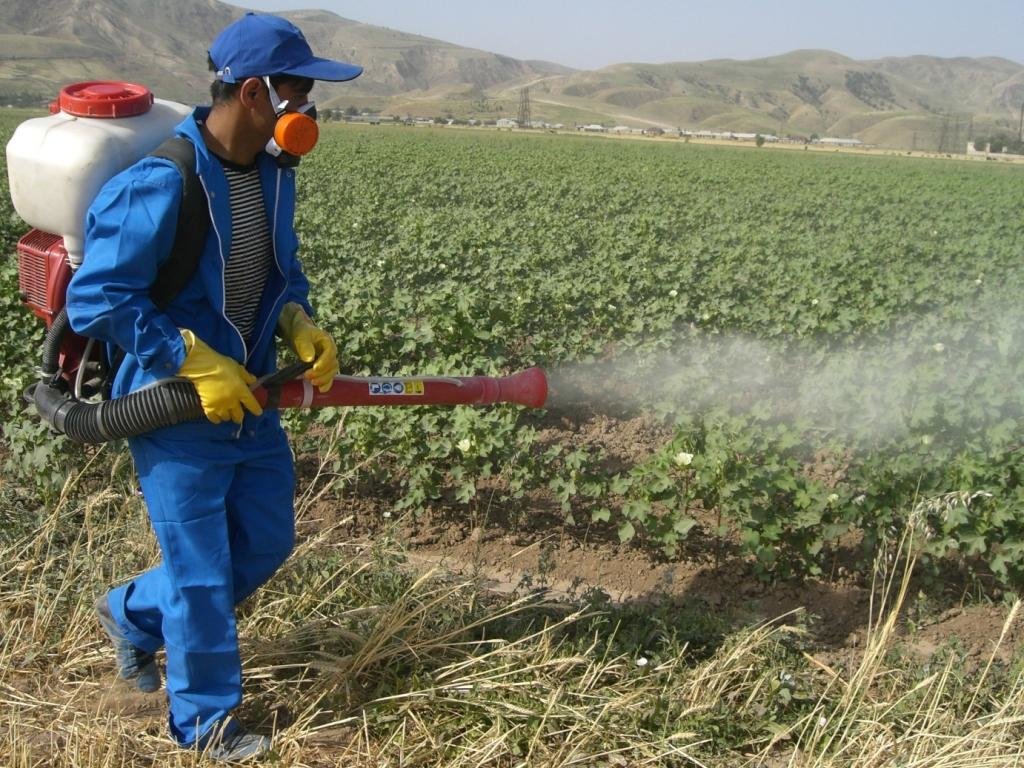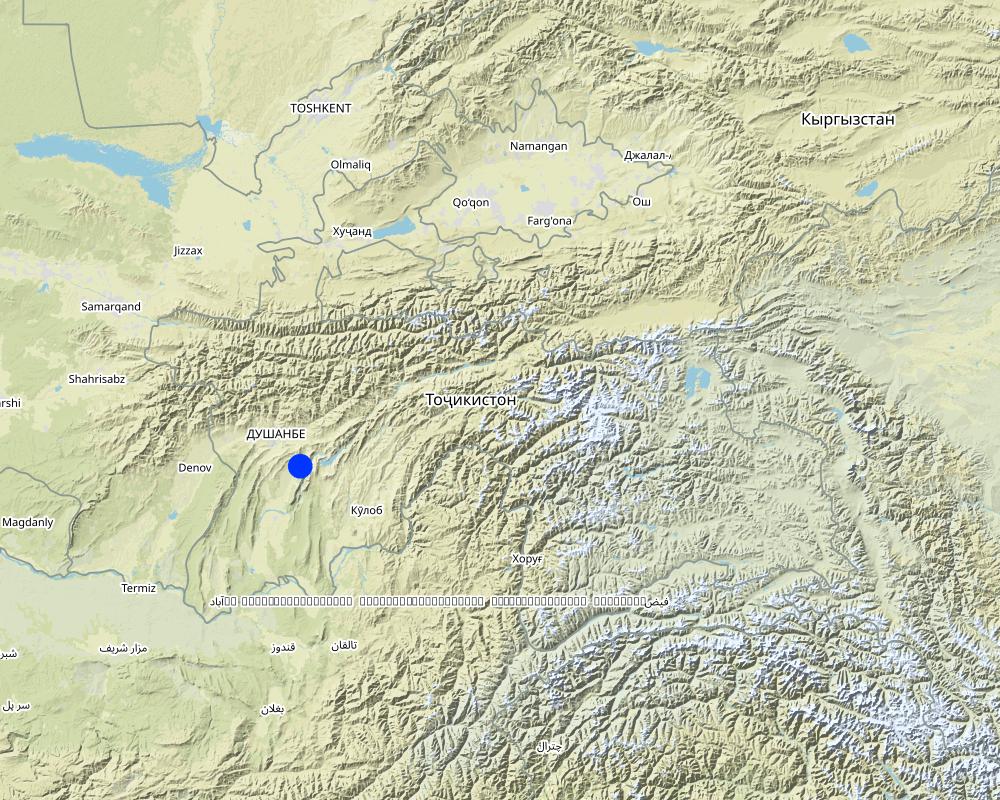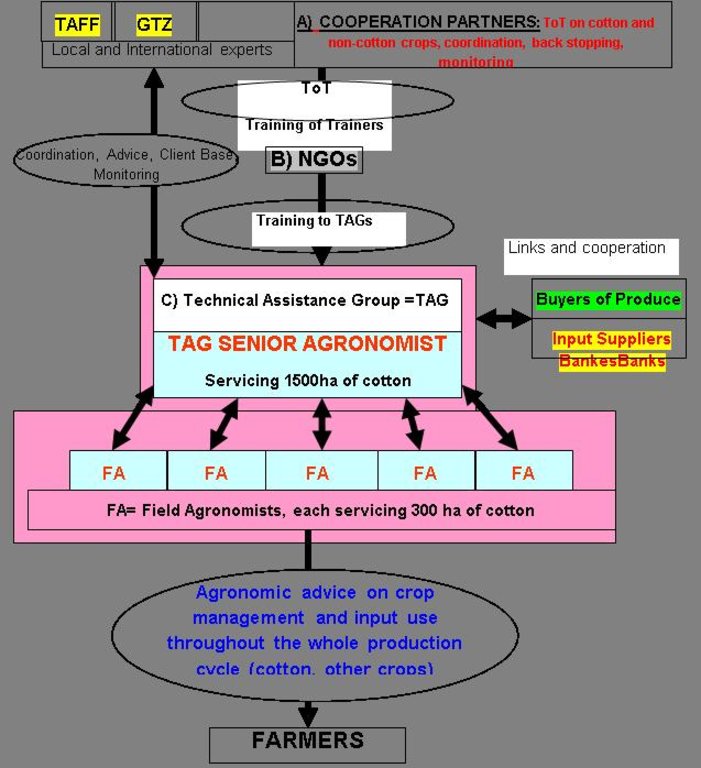Technical Assistance Groups (TAG) [طاجيكستان]
- تاريخ الإنشاء:
- تحديث:
- جامع المعلومات: Philippe Zahner
- المحرر: –
- المراجعون: David Streiff, Alexandra Gavilano, Joana Eichenberger
approaches_2448 - طاجيكستان
عرض الأقسام
توسيع الكل طي الكل1. معلومات عامة
1.2 تفاصيل الاتصال بالأشخاص الرئيسيين لمصدر المعلومات والمؤسسات المعنية بتقييم وتوثيق النهج
متخصص في الإدارة المستدامة للأراضي:
Weissen Hugo
hugoweissen@kaswag.com.au
النمسا
متخصص في الإدارة المستدامة للأراضي:
Kaelin Laurie
lauriekaelin@kaswag.com.au
النمسا
اسم المشروع الذي سهّل توثيق/تقييم النهج (إذا كان ذلك على صلة)
Pilot Program for Climate Resilience, Tajikistan (WB / PPCR)اسم المؤسسة (المؤسسات) التي سهلت توثيق/تقييم النهج (إذا كان ذلك على صلة)
Deutsche Gesellschaft für Internationale Zusammenarbeit (GIZ) GmbH (GIZ) - ألمانيا1.3 الشروط المتعلقة باستخدام البيانات الموثقة من خلال WOCAT
متى تم تجميع البيانات (ميدانيا)؟:
20/05/2011
يوافق جامع المعلومات والشخص (لاشخاص) الرئيسي لمصدر المعلومات على الشروط المتعلقة باستخدام البيانات الموثقة من خلال WOCAT:
نعم
2. وصف نهج الإدارة المستدامة للأراضي
2.1 وصف موجز للنهج
Technical advisory groups working on a 'fee for service' basis provide an effective service to farmers to achieve measurable yield increases, based on regular crop monitoring, crop management advice and effective use of inputs (fertilisers, water, pesticides, etc.)
2.2 وصف تفصيلي للنهج
وصف تفصيلي للنهج:
Aims / objectives: The TAG concept is designed to achieve the following key objectives: (1) Provide an effective agronomic advisory service to farmers to achieve measurable yield increases, based on regular crop monitoring, crop management advice and effective use of inputs (fertilisers, water, pesticides, etc.), (2) Support the development of agricultural input supply and distribution, and (3) Operate as independent entities on a competitive 'fee for service' basis (fee per ha), working towards achieving self sustainability.
Methods: TAGs are the central component of the framework and follow a very simple operational structure, basically consisting of a “Senior Agronomist” (SA), a “Organisation Manager” (OM) and a defined number of “Field Agronomists” (FA). The SA will register an advisory business as well as the OM and FA. The cooperation will be regulated by cooperation contracts. The SA will engage directly into service contracts with farmer clients to whom they will provide crop management recommendations throughout the entire production cycles. TAGs will be based in defined geographic areas, operating with local staff (SA, OM, FA) and build up a customer base large enough for financial self sustainability.
Stages of implementation: (1) TAGs are registered as enterprises, (2) TAGs develop business plans, (3) TAGs develop work plans and field records, (4) each TAG signs contract with cooperation partners (TAFF and GIZ-PSD project), (5) TAGs get first payment from cooperation partners (555 USD per TAG), (6) TAGs sign consulting contracts for 500 ha, farmers pledge to pay for advisory service 24 TJS/ha in the whole season, (7) quality control of advisory contracts concluded: visit of contracted farms to ensure the farmers understand the TAG-system, (8) TAGs do market analysis for the regional availability of suppliers for pesticides, fertiliser etc., mechanisation contractors, banks, buyers, (9) second payment from cooperation partners, 5 TJS per ha up to 500 ha contracted area per TAG, (10) third payment from cooperation partners, same conditions as previous point, (11) fourth payment from cooperation partners, 12 TJS per ha contracted area (only if field advisors are contracted and have received first salary, first field records are made and filed to the TAG documentation), (12) first payment from clients/farmers, 12 TJS per ha contracted area, (13) second payment from clients/farmers, 12 TJS per ha contracted area, (14) fifth payment from cooperation partners, 5 TJS per ha contracted area (only if contracts are fully pay through clients, TAG must handover documentation of their work).
Role of stakeholders: Cooperation partners provide expertise and training, support to the organisational and sustainable development of TAGs and financial support. NGOs (Agricultural Extension Service Providers) will be invited to enter into contract agreements for the provision of training to TAGs. TAGs consist of a “Senior Agronomist” (SA), a “Organisation Manager” (OM) and a defined number of “Field Agronomists” (FA).
2.3 صور عن النهج
2.5 البلد/المنطقة/المواقع التي تم تطبيق النهج فيها
البلد:
طاجيكستان
المنطقة/الولاية/المحافظة:
Khatlon, Soghd, RSS
مزيد من التفاصيل حول الموقع:
Yovon, Hissor, Vakhsh, Djomi, Konibodom, Zafar, Kuljob, Vose
Map
×2.6 تواريخ بدء وإنهاء تنفيذ النهج
أشر إلى سنة البدء:
2011
2.7 نوع النهج
- قائم على مشروع/برنامج
2.8 الغايات/الأهداف الرئيسية للنهج
The Approach focused mainly on other activities than SLM (productivity increase)
The main objectives of the approach were to: (1) Provide an effective agronomic advisory service to farmers to achieve measurable yield increases, based on regular crop monitoring, crop management advice and effective use of inputs (fertilisers, water, pesticides, etc). (2) Support the development of agricultural input supply and distribution. (3) Operate as independent entities on a competitive 'fee for service' basis (fee per ha), working from the start towards achieving self sustainability.
The SLM Approach addressed the following problems: low agricultural production, lack of technical knowledge
2.9 الظروف التي تمكن أو تعيق تنفيذ التقنية/التقنيات المطبقة بموجب النهج
الإطار المؤسساتي
- معيق
weak capacity of governmental agricultural extension services
Treatment through the SLM Approach: establishment of independent agricultural extension services
المعرفة حول الإدارة المستدامة للأراضي، والوصول إلى الدعم الفني
- معيق
little or no access of farmers to effective agronomic technical assistance services
Treatment through the SLM Approach: establishment of technical advisory groups TAGs
3. المشاركة وأدوار الأطراف المعنية
3.1 أصحاب المصلحة المعنيون بالنهج وأدوارهم
- مستخدمو الأراضي المحليون/المجتمعات المحلية
Entered contracts with TAGs to employ their advisory services
- متخصصون في الإدارة المستدامة للأراضي / مستشارون زراعيون
All senior agronomists are male. They were selected on the basis of their perceived experience and agronomy knowledge. Field agronomists were selected by their respective SA. Some of the field agronomists are female.
Received training provided by the cooperation partners (training of trainers)
- منظمة غير حكومية
AIN, ATAC and SAS Consulting (and other agricultural extension NGOs)
- منظمة دولية
GIZ-PSD project, TAFF Tajik Agricultural Finance Framework (EBRD)
3.2 انخراط مستخدمي الأراضي المحليين/المجتمعات المحلية في المراحل المختلفة للنهج
| انخراط مستخدمي الأراضي المحليين/المجتمعات المحلية | حدد من شارك وصف الأنشطة | |
|---|---|---|
| المبادرة/التحفيز | غير موجود | |
| التخطيط | غير موجود | |
| التنفيذ | سلبي | the land users pay the TAGs for their services with a service fee |
| الرصد/التقييم | غير موجود | |
| Research | غير موجود |
3.3 مخطط التدفق (إذا كان متاحًا)
3.4 اتخاذ القرار بشأن اختيار تقنية/تقنيات الإدارة المستدامة للأراضي
حدد من الذي قرر اختيار التقنية/التقنيات التي سيتم تنفيذها:
- متخصصون في الإدارة المستدامة للأراضي بمفردهم
اشرح:
agricultural extension service to provide assistance to land users
Decisions on the method of implementing the SLM Technology were made by by SLM specialists alone (top-down)
4. الدعم الفني وبناء القدرات وإدارة المعرفة
4.1 بناء القدرات/التدريب
هل تم تقديم التدريب لمستخدمي الأراضي / الأطراف المعنيين الآخرين؟:
نعم
حدد من تم تدريبه:
- موظفون ميدانيون/ مستشارون
شكل التدريب:
- technical advisory service
المواضيع المغطاة:
Innovative approaches to crop management, effective use of agricultural inputs (fertilizers, pesticides, water, etc), basics of advisory work, cotton growing, modern ways of plant protection, cooperation with other service providers, improving the performance of the TAG team, and improving the TAG business were key focus points.
4.2 خدمة استشارية
هل يملك مستخدمو الأراضي وصولا إلى خدمة استشارية؟:
نعم
حدد ما إذا كانت الخدمة الاستشارية متوفرة:
- في مراكز دائمة
وصف/تعليقات:
Technical Assisstance Groups (TAGs); Key elements: TAGs provide know-how on modern crop production and crop management techniques to individual farmer clients., TAGs establish links with input providers and buyers of produce, TAGs are financially self-sustainable through the service fee they collect from farmer clients
Advisory service is quite adequate to ensure the continuation of land conservation activities; The value of crop rotation to conservation and improvement of soil health is clear to the TAG. Problems associated with erosion and fertiliser leaching are being discussed in field training sessions.
4.3 تعزيز المؤسسات (التطوير التنظيمي)
هل تم إنشاء أو تعزيز مؤسسات من خلال هذا النهج؟:
- نعم، إلى حد كبير
حدد المستوى (المستويات) التي تم فيها تعزيز أو إنشاء المؤسسات:
- محلي
حدد نوع الدعم:
- مالي
- بناء القدرات/التدريب
اعط مزيدا من التفاصيل:
The TAGs were registered as formal entities. They were supported by the coordination partners financially and through training sessions.
4.4 الرصد والتقييم
هل يشكل الرصد والتقييم جزءا من النهج؟:
نعم
التعليقات:
economic / production aspects were regular monitored by project staff, land users through measurements; indicators: Measurement of yields by TAG and farmers, accumulation of data over time
area treated aspects were regular monitored by project staff, land users through observations; indicators: Approx. 17,000 ha being covered by TAG
area treated aspects were regular monitored by project staff, land users through measurements; indicators: Nearly 900 Dehkan Farms serviced
no. of land users involved aspects were regular monitored by project staff through observations; indicators: Communication between TAG, land users, input suppliers and project staff
management of Approach aspects were regular monitored by project staff through observations; indicators: gender of contracted farmers
socio-cultural aspects were regular monitored by project staff through observations; indicators: Measurement of yields by TAG and farmers, accumulation of data over time
economic / production aspects were regular monitored by project staff, land users through observations; indicators: Agronomic measurements of crop progress by TAG and project staff
technical aspects were regular monitored by project staff through measurements; indicators: Comprehensive collection of land use activities
technical aspects were regular monitored by project staff through observations; indicators: None
management of Approach aspects were regular monitored by None through measurements; indicators: None
There were several changes in the Approach as a result of monitoring and evaluation: Introduction of record keeping for field activities to serve as a decision making tool in the future. Introduction of systematic crop progress evaluations enabling much improved crop management. Communication between farmers and input suppliers is streamlined, with the expected outcome of improvements in quality and timing of input usage.
There were several changes in the Technology as a result of monitoring and evaluation: New tools introduced for record keeping and crop progress monitoring. Improvements in timing and quality of field activities (cultivation, fertilisation, irrigation etc). Improved access regarding timeliness and quality of production inputs.
4.5 البحوث
هل كانت البحوث جزءًا من النهج؟:
نعم
حدد المواضيع:
- الاقتصاد / التسويق
أعط تفاصيل إضافية وأشر إلى من قام بالبحوث:
Market analysis of regional availability of suppliers of pesticides, fertiliser etc., mechanisation contractors, banks, buyers.
5. التمويل والدعم المادي الخارجي
5.1 الميزانية السنوية لمكون الإدارة المستدامة للأراضي في النهج المذكور
التعليقات (على سبيل المثال المصادر الرئيسية للتمويل/الجهات المانحة الرئيسية):
Approach costs were met by the following donors: international (GIZ-PSD, TAFF): 20.0%; national non-government (TAGs): 80.0%
5.2 الدعم المالي/المادي المقدم لمستخدمي الأراضي
هل حصل مستخدمو الأراضي على دعم مالي/ مادي لتنفيذ التقنية/ التقنيات؟:
نعم
إذا كانت الإجابة بنعم، حدد نوع (أنواع) الدعم والشروط والمزودين:
TAFF/GIZ-PSD project will provide a voucher to the senior agronomists to pay for additional NGO services, which they might need based on individual requirements. The voucher will cover 80% of the cost
5.3 إعانات لمدخلات محددة (بما في ذلك العمالة)
- غير ذلك
| غير ذلك(حدد) | إلى أي مدى | حدد الإعانات |
|---|---|---|
| Establishment of TAGs at the beginning | ممول جزئيا |
التعليقات:
During the initial establishment period of the TAGs they received 5 supportive payments. Those are either fixed amounts, or based on the number of hectares contracted by the TAGs
5.4 الائتمان
هل تم توفير ائتمان في إطار نهج أنشطة الإدارة المستدامة للأراضي؟:
كلا
6. تحليل الأثر والتصريحات الختامية
6.1 آثار النهج
هل ساعد النهج مستخدمي الأراضي على تنفيذ وصيانة تقنيات الإدارة المستدامة للأراضي؟:
- لا
- نعم، قليلا
- نعم، باعتدال
- نعم، إلى حد كبير
In the longer term land users benefit from agronomic advise to improve sustainable land management (e.g. fertiliser use, irrigation efficiency, crop rotation).
هل ساهم النهج في تمكين الفئات المحرومة اجتماعيا واقتصاديا؟:
- لا
- نعم، قليلا
- نعم، باعتدال
- نعم، إلى حد كبير
Employment of male and female agronomists through TAG, partly funded by service receivers (farmers). Expected increases in land productivity as a result of advice will lead to higher farm income.
Did the Approach lead to improved livelihoods / human well-being?
- لا
- نعم، قليلا
- نعم، باعتدال
- نعم، إلى حد كبير
Employment of agronomists through TAG, is partly funded by the service receivers (farmers). Expected increases in land productivity as a result of this agronomy advice will lead to higher farm income.
Did the Approach help to alleviate poverty?
- لا
- نعم، قليلا
- نعم، باعتدال
- نعم، إلى حد كبير
Employment of male and female agronomists through TAG, partly funded by service receivers (farmers). Expected increases in land productivity as a result of advice will lead to higher farm income.
6.2 المحفز الرئيسي لقيام مستخدمي الأراضي بتنفيذ الإدارة المستدامة للأراضي
- زيادة الإنتاج
Farmers expect increased production as a result of agronomic advice
- زيادة الربح (القدرة)، وتحسين نسبة التكلفة إلى العائد
Framers expect increased farm income as a result of agronomic advice
6.3 استدامة أنشطة النهج
هل يمكن لمستخدمي الأراضي المحافظة على استدامة ما تم تنفيذه من خلال النهج (بدون دعم خارجي)؟:
- لا
إذا كان الجواب لا أو غير متأكد، حدد ذلك وعلق عليه:
Land users rely on agronomic advice and on timely access to good quality inputs. TAGs, if successful, can provide a service to the farmer for which he/ she is prepared to pay for. TAGs if successful however, are expected to continue and grow their advisory services businesses and become self sustainable.
6.4 نقاط قوة/مزايا النهج
| نقاط القوة/ المزايا/ الفرص من وجهة نظر مستخدمي الأراضي |
|---|
| Quality agronomic advice (How to sustain/ enhance this strength: Ongoing training und upskilling of agronomists. Establishment of a strong core of agronomic advisors who themselves will train new agronomists as their advisory businesses grow) |
| نقاط القوة/ المزايا/ الفرص من وجهة نظر جامع المعلومات أو غيره من الاشخاص الرئيسيين لمصدر المعلومات |
|---|
| Systematic and professional approach to the provision of services (How to sustain/ enhance this strength: Ongoing training of TAGs and NGOs) |
| TAGs are registered service providers (How to sustain/ enhance this strength: Return clients, increase in client numbers) |
| Networking between TAGs and input suppliers (How to sustain/ enhance this strength: Facilitation and improvement of communication, training) |
7. المراجع والروابط
7.1 طرق جمع/مصادر المعلومات
- زيارات ميدانية، مسوحات ميدانية
- مقابلات مع مستخدمي الأراضي
الروابط والوحدات المواضيعية
توسيع الكل طي الكلالروابط
لا يوجد روابط
الوحدات المواضيعية
لا يوجد وحدات مواضيعية


